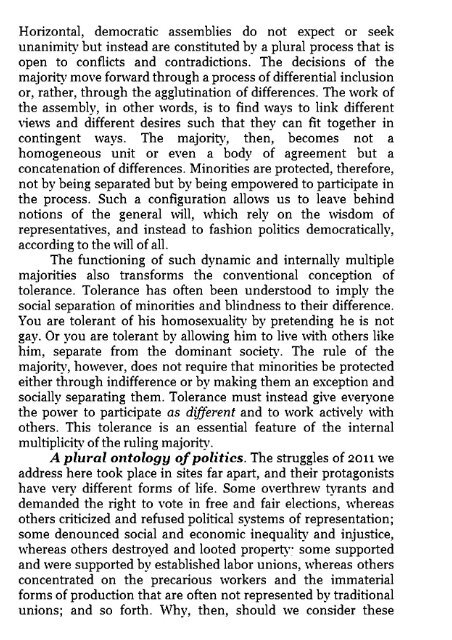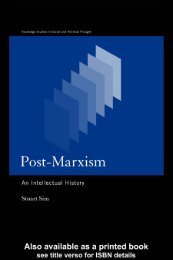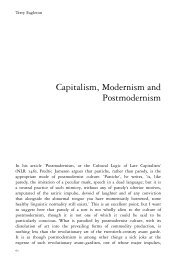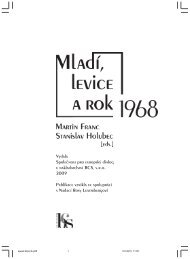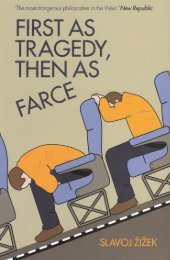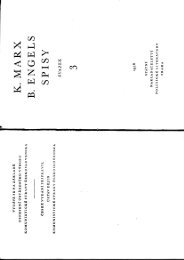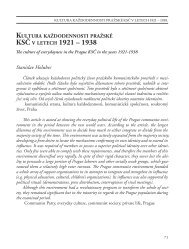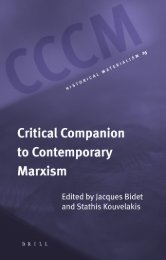Chapter 1: Subjective Figures of the Crisis ... - Negri in English
Chapter 1: Subjective Figures of the Crisis ... - Negri in English
Chapter 1: Subjective Figures of the Crisis ... - Negri in English
Create successful ePaper yourself
Turn your PDF publications into a flip-book with our unique Google optimized e-Paper software.
Horizontal, democratic assemblies do not expect or seek<br />
unanimity but <strong>in</strong>stead are constituted by a plural process that is<br />
open to conflicts and contradictions. The decisions <strong>of</strong> <strong>the</strong><br />
majority move forward through a process <strong>of</strong> differential <strong>in</strong>clusion<br />
or, ra<strong>the</strong>r, through <strong>the</strong> agglut<strong>in</strong>ation <strong>of</strong> differences. The work <strong>of</strong><br />
<strong>the</strong> assembly, <strong>in</strong> o<strong>the</strong>r words, is to f<strong>in</strong>d ways to l<strong>in</strong>k different<br />
views and different desires such that <strong>the</strong>y can fit toge<strong>the</strong>r <strong>in</strong><br />
cont<strong>in</strong>gent ways. The majority, <strong>the</strong>n, becomes not a<br />
homogeneous unit or even a body <strong>of</strong> agreement but a<br />
concatenation <strong>of</strong> differences. M<strong>in</strong>orities are protected, <strong>the</strong>refore,<br />
not by be<strong>in</strong>g separated but by be<strong>in</strong>g empowered to participate <strong>in</strong><br />
<strong>the</strong> process. Such a configuration allows us to leave beh<strong>in</strong>d<br />
notions <strong>of</strong> <strong>the</strong> general will, which rely on <strong>the</strong> wisdom <strong>of</strong><br />
representatives, and <strong>in</strong>stead to fashion politics democratically,<br />
accord<strong>in</strong>g to <strong>the</strong> will <strong>of</strong> all.<br />
The function<strong>in</strong>g <strong>of</strong> such dynamic and <strong>in</strong>ternally multiple<br />
majorities also transforms <strong>the</strong> conventional conception <strong>of</strong><br />
tolerance. Tolerance has <strong>of</strong>ten been understood to imply <strong>the</strong><br />
social separation <strong>of</strong> m<strong>in</strong>orities and bl<strong>in</strong>dness to <strong>the</strong>ir difference.<br />
You are tolerant <strong>of</strong> his homosexuality by pretend<strong>in</strong>g he is not<br />
gay. Or you are tolerant by allow<strong>in</strong>g him to live with o<strong>the</strong>rs like<br />
him, separate from <strong>the</strong> dom<strong>in</strong>ant society. The rule <strong>of</strong> <strong>the</strong><br />
majority, however, does not require that m<strong>in</strong>orities be protected<br />
ei<strong>the</strong>r through <strong>in</strong>difference or by mak<strong>in</strong>g <strong>the</strong>m an exception and<br />
socially separat<strong>in</strong>g <strong>the</strong>m. Tolerance must <strong>in</strong>stead give everyone<br />
<strong>the</strong> power to participate as different and to work actively with<br />
o<strong>the</strong>rs. This tolerance is an essential feature <strong>of</strong> <strong>the</strong> <strong>in</strong>ternal<br />
multiplicity <strong>of</strong> <strong>the</strong> rul<strong>in</strong>g majority.<br />
A plural ontology <strong>of</strong> politics. The struggles <strong>of</strong> 2011 we<br />
address here took place <strong>in</strong> sites far apart, and <strong>the</strong>ir protagonists<br />
have very different forms <strong>of</strong> life. Some overthrew 7 tyrants and<br />
demanded <strong>the</strong> right to vote <strong>in</strong> free and fair elections, w T hereas<br />
o<strong>the</strong>rs criticized and refused political systems <strong>of</strong> representation;<br />
some denounced social and economic <strong>in</strong>equality and <strong>in</strong>justice,<br />
w T hereas o<strong>the</strong>rs destroyed and looted property- some supported<br />
and were supported by established labor unions, w T hereas o<strong>the</strong>rs<br />
concentrated on <strong>the</strong> precarious workers and <strong>the</strong> immaterial<br />
forms <strong>of</strong> production that are <strong>of</strong>ten not represented by traditional<br />
unions; and so forth. Why, <strong>the</strong>n, should we consider <strong>the</strong>se


